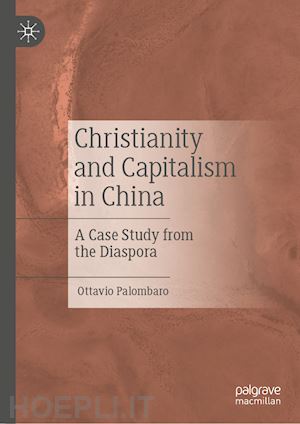

Questo prodotto usufruisce delle SPEDIZIONI GRATIS
selezionando l'opzione Corriere Veloce in fase di ordine.
Pagabile anche con Carta della cultura giovani e del merito, 18App Bonus Cultura e Carta del Docente
This book links Calvinist belief in the Perpetual Assurance of Salvation with self-efficacy for economic success. Certain values are at stake for the success of economic behavior. Since the genesis of modern capitalism, a set of beliefs proper of Calvinism (mainly Predestination but also Beruf, Inner-worldly Asceticism, role of Sects…) was said by Max Weber to cause an anxiety about salvation and generate a propensity to economic success as a sign of election. In order to observe this in action today, it is crucial to consider the evolution that the Protestant ethic went through migrating first in north America and lastly through the Protestant revival of China. Wenzhou is called ‘Jerusalem of China’ for its large Protestant community that is also strongly involved in business. Some scholar already pointed out the presence among those entrepreneurs of this Protestant ethic (Yi Xiang, Boss-Christian…). The data presented in this comparative qualitative study pertain to ethnographic observations, job-shadowing and interviews done among Chinese Christian and non-Christian entrepreneurs from Wenzhou living in Milan, Italy. The results show with some adjustments the presence of a Chinese-version of the Protestant ethic overlapping with several values proper to the Chinese context (Confucianism, lineage, social network). The extension of the study to other cases must be done with caution considering the non-causal justificatory role of the belief. Regardless: successful entrepreneurship involves specific social, cultural and even religious aspects that move beyond mere business strategies.
1. Entrepreneurship and economic success.- 2. Protestantism and economic success.- 3. Actualization of the protestant ethic.- 4. Methodology of the research.- 5. Chinese entrepreneurship in milan.- 6. The case for a protestant chinese work ethic.- 7. The counterpart for a purely chinese work ethic.
Dr. Ottavio Palombaro is professor at New College, Franklin. He studied at the University of Rome "La Sapienza" (B.A.), University of Turin (M.A.), University "Statale" of Milan (Ph.D.), Tyndale Theological Seminary in Netherlands, Puritan Reformed Theological Seminary in Grand Rapids, Michigan U.S.A. (M.Div.) and the Free University of Amsterdam (Th.D.).











Il sito utilizza cookie ed altri strumenti di tracciamento che raccolgono informazioni dal dispositivo dell’utente. Oltre ai cookie tecnici ed analitici aggregati, strettamente necessari per il funzionamento di questo sito web, previo consenso dell’utente possono essere installati cookie di profilazione e marketing e cookie dei social media. Cliccando su “Accetto tutti i cookie” saranno attivate tutte le categorie di cookie. Per accettare solo deterninate categorie di cookie, cliccare invece su “Impostazioni cookie”. Chiudendo il banner o continuando a navigare saranno installati solo cookie tecnici. Per maggiori dettagli, consultare la Cookie Policy.